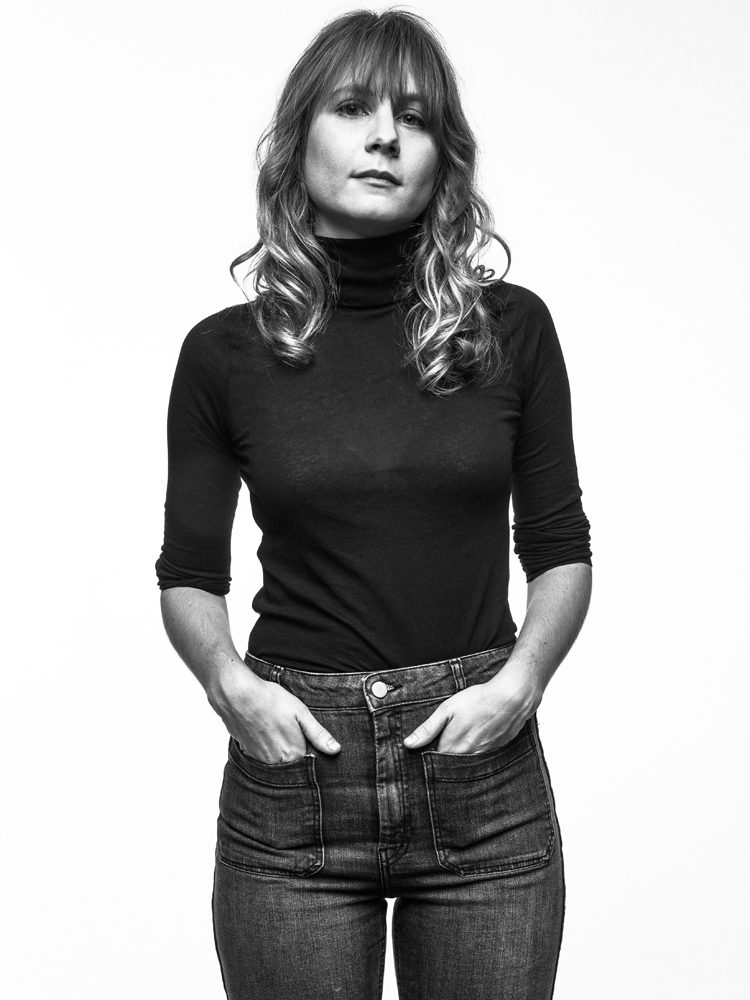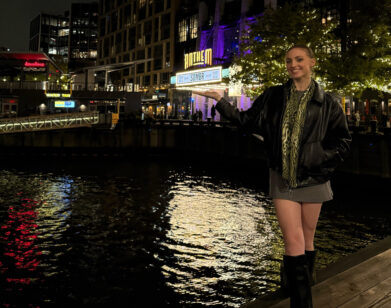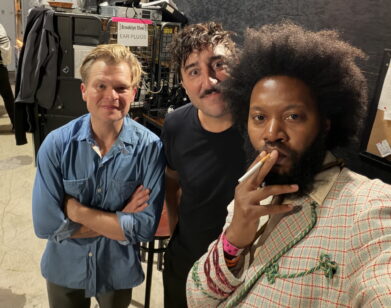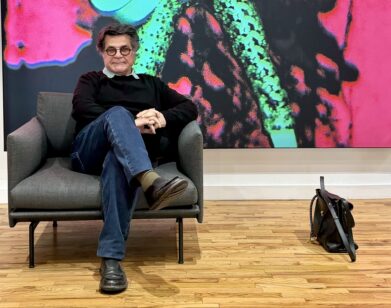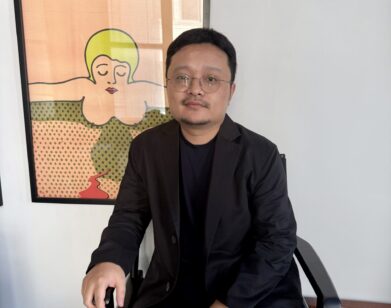NYFF
Annie Baker Is Coming to a Movie Theater Near You
For an entire generation of playwrights and theater lovers, Pulitzer Prize-winner Annie Baker has become a rare figure canonized in her youth. Devotion to her works can be felt wandering the halls of many a drama school, where dramaturgs argue over her themes, actors fret over her pauses, and playwrights present brazen imitations of her elegant scene constructions. For many, ascending to the heights of one’s field is an accomplishment that gives license to rest on one’s laurels. But last week, in a hidden balcony of Alice Tully Hall, Baker sat down with me to reintroduce herself to the world as a filmmaker.
Her debut film, Janet Planet, which had its New York premiere to great fanfare at the New York Film Festival, finds the artist digging into familiar territory in fascinatingly new ways. Last week, we discussed how fallow periods can shape us anew, practicing patience as an Aries, and the ways in which entering the arena of cinema was in many ways more intimidating than entering the canon of theater.
———
JEREMY O. HARRIS: Well, I am in awe of you. I don’t know if you saw my tweet yesterday, but I tweeted about you.
ANNIE BAKER: No! You tweeted about me?
HARRIS: Yeah. I said this didn’t feel like a first feature. It felt like a 50th.
BAKER: I’m a very old lady.
HARRIS: No, no, no. In the sense that it felt so assured, like you knew exactly what you were doing and what you wanted. I think that, oftentimes, you can feel nervousness in a first feature, or a half-gesture towards a fully solidified self. I’m sure you feel like there were some things that weren’t fully solidified. But for the most part, I felt like it sounded exactly like it wanted to sound.
BAKER: Oh, that’s really cool.
HARRIS: It was really cool. Also, getting that performance out of such a young actor is insane.
BAKER: She’s amazing. I was like, “It only is going to work if it’s a particular kind of child.”
HARRIS: She looks kind of like you now.
BAKER: I didn’t know this when I cast her, but we’re both half-Irish, half-Jewish.
HARRIS: Are you serious? Wait, and what’s your sign? Are you a Virgo?
BAKER: Aries. What are you?
HARRIS: I’m a Gemini. My fiancé is an Aries. That’s so interesting. I feel like, because Aries are the youngest sign, they’re so impatient. Where does your patience come from?
BAKER: Is this your first interview question?
HARRIS: This is like, my fourth now.
BAKER: I love you so much. I don’t feel like a patient person. Theater has taught me to be more patient, because of the patience [required to spend] a month in a rehearsal room letting people find it themselves instead of finding it for them. I do think very quickly and I often know exactly what I want it to be quite early on, and that it can be a good thing or a really bad thing. It’s very difficult to be like, “We only have 10 minutes to shoot the scene.” And then it was very emboldening and empowering to be like, “Well, I know exactly what I want it to be, so let’s make it happen.” In the theater, actually, if you say that too early, it’s really smothering and people respond really badly to that kind of decisiveness. Does that make sense?
HARRIS: I genuinely think that one of the things I learned from Robert O’Hara is that he was like, “Jeremy, as a writer, you’ve got to have all your temper tantrums at home. You have to be upset with yourself, feel unsure, feel insecure, and figure it out alone. And then you gave it to someone and now we’re in a room all figuring out together and you have to let us have that same time to have that process. And that can be really frustrating.”
BAKER: Yeah. Sam Gold said a similar thing to me once when I was driving him crazy in tech and he was like, “How would you feel if, while you were writing your first draft, I was looking over your shoulder and saying, ‘I don’t like that.'” And I was like, “That’s a good point.”
HARRIS: Often, you can feel at odds with the director very quickly.
BAKER: Yeah. But I also felt like, for better or for worse, I was the person who had to direct this movie.
HARRIS: Yes.
BAKER: I got really lucky with Zoe. She was word-perfect. I’ve never worked with an actor like that. She knew her lines, she knew everybody else’s lines. She was, technically, kind of just perfect—and what we then got to work on together was physical choreography. But I left her alone most of the time emotionally.
HARRIS: I’m rooting for her for every newcomer award. I was like, “I’m going to call the Gothams, call BAFTA.” It has to happen.
BAKER: She’s amazing. And she doesn’t want attention, which is very unusual for a kid in a movie. Nothing about what she’s doing is trying to draw attention to itself.
HARRIS: Yeah. I’m going to talk about the movie in five seconds, because I do think it’s important for me as a student of yours in a lot of ways. You’re not significantly older than me, but you definitely set a template as a playwright that I very much wanted to be a part of. You rewrote the rules of contemporary theater and also built a young cool audience [for it]. You were the first playwright I read about in Vice.
BAKER: That is so wild.
HARRIS: It’s true. You were like, a cool playwright. This year, I feel like a lot of playwrights decided to make a film and not just write one. Celine Song, Tina Satter.
BAKER: Tina was in my class at Brooklyn College!
HARRIS: Oh my god. A lot of people wanted Slave Play to be a movie. It’s the worst movie.
BAKER: That’s how I feel about The Flick. I was like, “Worst movie ever.”
HARRIS: But some of our plays would make great movies. What made you decide to write an original film?
BAKER: For me, it’s something I wanted to do for a super-duper long time. And, I hate to say it, but the pandemic is what helped me finally write the screenplay. I was supposed to direct Infinite Life in New York that spring and everything was canceled. We didn’t know when the theater was ever coming back. I had a 10-month-old and I really had a moment where I didn’t know what to do with myself. I knew I was going to take care of this baby. But I also had to make meaning for myself while she was napping, and I actually returned to an old laptop and had a document and I was like, “Oh, I’ll write the movie that I’ve always wanted to write for myself to direct that’s about a little girl in Western Massachusetts.” It was an exercise, because I’ve always wanted to direct. [But] I don’t want to direct anyone else’s screenplay. So I was like, “Well, what if I just write a strange movie that’s more in the vein of the cinema I love, and less of the kind of movie I had to write when I took a job. As an experiment, can I do it? Can I write that movie I’ve been thinking about for 20 years?” Then I sent it to Rose Garnett, who was at BBC at the time. And she was like, “Let’s make it.” Things happened very quickly after that, and by “quickly” I mean over two years. But it felt quicker.
HARRIS: That’s quicker than doing a play, sometimes.
BAKER: Yeah. It’s crazy to me that Janet Planet and Infinite Life are coming out around the same time, because Infinite Life feels like a play I started in 2016 or 2017, and Janet Planet‘s a project I started in 2020.
HARRIS: I’m so curious how you found the gumption to write. I’m coming back to writing now after I was really depressed and frustrated by two projects I was supposed to be doing, where I got sort of bullied and sidelined by artistic directors that had committed to them before the pandemic. I know that happened to you too with another play. Something about it made me just not even want to write.
BAKER: My last new play premiered in New York in 2017. So it has actually been quite a long time since I’ve debuted something new anywhere. I think fallow periods are valuable. Then, looking back, you’re like, “Oh, thank god I didn’t write anything for a year and I just read and spent time with people I love and taught.” You can account for yourself in a really nice way with teaching. With Janet Planet, it really was just a challenge to myself. I didn’t think I was going to put it out into the world. Of course, those are often the things that then end up very quickly finding their way into the world and shocking you.
HARRIS: I want to know what the timestamp is on the microwave scene.
BAKER: It’s actually not that long. I think it’s 45 seconds.
HARRIS: It’s only 45 seconds? It’s amazing. I felt like I watched the entire thing happen.
BAKER: It was another thing where it was like like, “You’ve got two minutes to shoot this shot.” I wanted it to start at the beginning and it had to cook, so the microwave had to turn on and then end. There was a two-minute long microwave shot. But that is too long.
HARRIS: I love it. I think it’s like a Rosetta Stone for understanding the film.
BAKER: Oh, thank you. Some people really wanted me to cut it and some people still are really annoyed about it. I haven’t read everything people have written about the film. But if you hate the movie, you really hate the microwave. But for me it was very important.
HARRIS: I love it. Again, that’s the type of confidence that American filmmakers are not often allowed to have in their first feature or feel permission to have. And it’s just such a badass movie. Your shot construction is genius. It’s so filmic and photographic and immediately you’re like, “I want to steal that.” But on a writing level, what you did that I think is a sly trick is that, much like meditating or hypnosis, you bring us back to what it feels like to be 11 and have that summer that feels like it goes on forever. I grew up with just me and mom. And there was a summer after my mom got a divorce where she was doing truth or dare with grown men downstairs. And I’ve never forgotten that summer because it was also the summer I realized my mom had a sexuality and my mom was weird and made mistakes and was sad. And it both drew me close to her and also pulled me farther away.
BAKER: Yeah. That’s such a beautiful way to put it.
HARRIS: Your film talks about that rift that happened and that’s the most radical thing about the movie to me.
BAKER: Thank you. It’s a very beautiful moment between a child and a parent where you’re like, “They’re separate from me. They have a perspective, they have sexuality, they have dysfunction. I still love them and they’re not a perfect love object.” It’s devastating and beautiful.
HARRIS: I love the ways in which the men are so silent and yet so loud in this movie. There was a time when people were looking at Annie Baker as this woman who understood a type of white masculinity and was dissecting it. But now, I feel like the more writing you’ve done, the more and more quiet your men have gotten.
BAKER: Wow, that’s so interesting. I’m going to ponder that. In the original script, and we did shoot it, Will Patton had a 12-minute monologue about his spiritual healer in Brazil. And it was actually a huge plot point in the movie. And when we were cutting it, we realized that the movie is so quiet and the dialogue is so sparse that we wanted that conversation between Lacey and Janet in bed to actually be the first really meaty conversation in the movie. So that monologue ended up not making sense for a number of reasons. Will Patton was amazing in it. It should be a DVD extra or something.
HARRIS: I also just saw Infinite Life, so that’s why I’m thinking about it too. It’s almost like you killed men in your work at John.
BAKER: Oh my god, I really love your theories. I feel like they’re better than anything I can come up with.
HARRIS: This week has made me really miss being a critic.
BAKER: I’m actually now thinking about this monologue with John where the man is taking the place of god. There is this weird moment where man as god is eliminated. Anyway, I don’t reread my plays and I’m so curious if you do. But what you’re saying is very potent.
HARRIS: I don’t reread my plays either. I like to re-watch them, but I don’t read them. BAKER: Wait, why don’t you just do more critical writing?
HARRIS: It’s complicated.
BAKER: Well, it’s really complicated when you’re a playwright. I’ve actually thought about this, because I would kill to write about Branden [Jacobs Jenkins’s] work in a way, but I feel like we actually are too close of friends with each other. It’s too tight a community. You should write a very long essay about Amy Herzog’s plays. But also, you were her student and you’re friends with her and that would be awkward. We all know each other too well. I wish I could read reviews by you guys.
HARRIS: Novelists write and they also write takedowns of each other intensely.
BAKER: I know. But there’s more of them.
HARRIS: Yes, there’s more of them and there’s more money, I think. A playwright can work on a play for five years, finally get it done at New York Theater Workshop, and only make $12,000 from the play, if that. That’s why we’re all writing for TV and dying slowly inside. The first check I got for doing my play on Broadway was $45,000. And it was like, “Great, this is amazing. I can rent an apartment in New York now.” But if I had only existed as an off-Broadway playwright, I wouldn’t have been able to move to New York. The fact that my play went to Broadway right after grad school is the only reason I’m able to live in New York. In the seventies, all these plays were on Broadway. Anyway, if more of us were going to Broadway, we could talk critically about each other.
BAKER: I’ve never had a play on Broadway, so I actually don’t know the numbers. That is wild. It’s like, your friend’s making $5,000 and then you write a mixed review of their play. It’s awful. And then people don’t show up to the play because they got mixed reviews. Fuck that.
HARRIS: Also, a mixed review shouldn’t be a deeply negative thing, right?
BAKER: No.
HARRIS: Now, in the critical landscape of The New York Times, they don’t have the ability to say, “This is good, but not great. Or this is bad, but not that bad. Check it out.” It’s always either, “this is the greatest thing you’ve ever seen” or “don’t see it at all.” And that’s not a healthy place to be critically.
BAKER: I agree.
HARRIS: Okay, last question. What’s next?
BAKER: I really want to make a second movie. I’ve been thinking about it all the time. I’m just waiting for my time to open up so I can write it.

